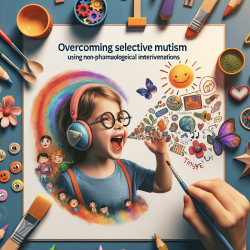As a speech-language pathologist dedicated to creating positive outcomes for children, it's crucial to stay informed about the latest research and best practices. One such pivotal study is "Problems in treatment and training of autistic children growing up in China: A follow-up case report" by Liu et al. (2020). This research sheds light on the challenges faced by autistic children in China and underscores the importance of lifelong rehabilitation training.
The Current Landscape
The study by Liu et al. (2020) highlights several critical issues in the treatment and training of autistic children in China:
- Interventions are primarily carried out by professionals in rehabilitation institutions and special schools.
- There is a lack of effective training and treatment for older autistic children.
- Autistic adults often end up in mental hospitals due to the absence of societal accommodations.
These findings emphasize the need for a more comprehensive approach to autism treatment that spans the individual's lifetime.
Implementing Research Outcomes
For practitioners looking to enhance their skills and improve outcomes for autistic children, here are some actionable insights derived from the study:
1. Emphasize Lifelong Training
The research underscores the importance of continuous rehabilitation training. Practitioners should:
- Develop long-term treatment plans that evolve with the child's age and developmental stage.
- Incorporate family training programs to ensure that parents are equipped to support their child's development at home.
2. Advocate for Policy Changes
The study calls for optimized policies and resources in several areas:
- Medical treatment and healthcare
- Education and training
- Social assistance and security
- Labor employment and social culture
Practitioners can play a crucial role in advocating for these changes by:
- Engaging with policymakers to highlight the needs of autistic individuals.
- Collaborating with other professionals to create a unified voice for policy reform.
3. Leverage Online Therapy
Given the constraints highlighted in the study, online therapy platforms like TinyEYE can offer significant advantages:
- Provide accessible, consistent therapy sessions regardless of geographical limitations.
- Facilitate continuous monitoring and adjustment of treatment plans.
- Offer a wealth of resources and training materials for both practitioners and families.
Encouraging Further Research
While the study by Liu et al. (2020) provides valuable insights, it also highlights the need for further research in several areas:
- Effective intervention strategies for older autistic children.
- Long-term outcomes of various treatment approaches.
- Societal integration and support mechanisms for autistic adults.
Practitioners are encouraged to contribute to this body of knowledge by:
- Conducting their own research and sharing findings with the broader community.
- Participating in collaborative studies and professional networks.
Conclusion
The research by Liu et al. (2020) serves as a critical reminder of the ongoing challenges in autism treatment and the need for lifelong support. By implementing these insights and advocating for systemic changes, practitioners can significantly enhance the quality of life for autistic individuals.To read the original research paper, please follow this link:
Problems in treatment and training of autistic children growing up in China: A follow-up case report.










